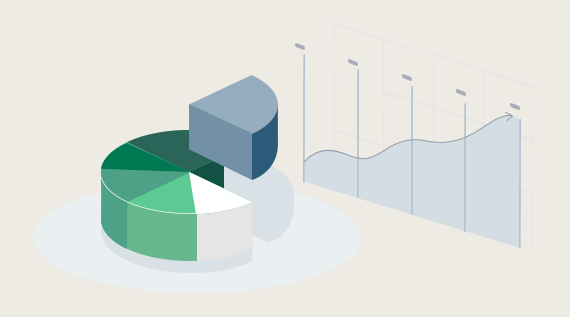Personal Wealth Management / Expert Commentary
Debunkery: Fisher Investments’ Founder, Ken Fisher, Debunks the Belief That Interest Pays Dividends
Fisher Investments’ founder, Executive Chairman and Co-Chief Investment Officer, Ken Fisher, reviews a chapter in his best-selling book, Debunkery, which challenges the longstanding belief that investors should place an emphasis on dividend- and interest-generating assets in their portfolios, particularly to supplement cash-flow needs. However, Ken says this strategy can limit a portfolio’s long-term growth potential.
Ken details how “homemade dividends”—the selective selling of stocks—may be a better option for generating cash flow while continuing to optimize long-term growth.
Transcript
Ken Fisher:
Once you realize that every year you're going to do it this way, whether the market's up or down, it gets you to not be taking the market so seriously. You'll have down years and you'll get through them. So every month I go over a chapter out of my old book, Debunkery, to cover something that people commonly think that's just wrong. And this time, and I do that, you don't need to get the book. You can just listen to all these ones that I put out every month. They're all online. This month I'm doing Bunk number 29, which is "that interest pays dividends."
You know, a long time ago, I used to weigh a lot more than I weigh. And I went to the doctor and he told me I should lose weight, and I did. And he said I was one of the few patients that he ever had that actually did lose the weight that he told him to lose. And he said, this will pay interest. It'll pay dividends when you're older. And I thought interest and dividends. Hmm? But the reality is, taking care of your health may reward you in the long term, but for the most part, this view stems from the following concept: I'm getting close to retirement age or I'm in retirement age, so I have to manage my portfolio more conservatively and therefore I need it to mostly be in fixed income. Therefore I need interest. I need dividends to pay the cash flow that I'll live on in my retirement years. Maybe with my spouse. In my case, I hope certainly with my spouse. And in that there's this confusion. And the confusion is, the cash flow that you need to pay your bills versus the delivery format of that cash flow, which are two separate things.
You need a certain amount of money to pay your bills. I hope you're halfway decent. There's a lot of people doing great detail, and some people do, more or less, on the back of an envelope and either will work if that's what's right for you in planning out how much you spend per month. How much you need to spend per month, how much you can afford to spend per month. But the afford is money that you take out of your assets somehow, some way. And there's an age old saying that was very common when I was young. Hear it less nowadays. I can't invade my principal. I have to spend only what I get in interest or dividend income.
That's kind of wrong because again, it confuses the format of the delivery of the cash flow with the usage of the cash flow. If you take your assets and you figure out what you need to spend, you probably have a fairly long time ahead of you in your life that you need this money to work for you. If you're at or approaching retirement age, let's say you're 65, you're probably going to live about another 20 years. If there's two of you, you're a married couple, one of you is almost certainly going to live about 20 years. You might get hit by a car tomorrow and die, but in that case, the rest of this discussion doesn't matter. If you're going to live another 20, and you might live longer than that 20 years, because the next 20 years, as has been the case in all of the recent decades, medical science keeps making things better so people tend to live a little longer. Total life expectancy in America has fallen, and you may have read that, but that's because of young people doing stupid stuff, like fentanyl and other things that make youthful mortality have gone way up.
But the people that get to be retirement age, they keep living longer and longer, and you got a long time ahead of you. And you don't want to have too low a rate of return on that money that you need for 20-plus years. And when you think about that, you take today. People will say, I hear often, and I'm going along and a little "ring around the Rosie" to do this for you here, but I'm going to come back to the book here in a minute. People say, gee, what do I need stocks for? You know, I can get 5% off of short term stuff like a CD. Yeah, maybe. But CD is actually taxable income if you're not in a tax-deferred or tax-free account. Inflation is running a little over 3%. If you're in a particularly high income tax area, maybe you're on the West Coast, or maybe not Washington State, but Oregon, California. Maybe you're in New York. Really New York City, really high income tax rate. Your total return on that 5% is negative. To have that when you need the money to last you for a really, really long time is plain-fully self-destructive. The fact is in the long term, going back to the beginning of the S&P 500 in 1925, inflation has averaged 3% a year, some years more, some years less. Obviously. Stock markets averaged a little over ten. This year, you got that 5% short term rate. Inflation is now running at a little over 3% currently. But stocks are already up this year over 17%.
The fact of the matter is, in the long-term, stocks do better than bonds or cash. What I've always recommended people do is to create what I call homemade dividends. Homemade dividend means figure out what you actually can afford to spend as a percentage of your capital. Aim at relatively liquid high return on capital assets as categories. Plan irregularly over time, to sell a little bit to get your annual cash needs. And pay yourself that. Capital gains have a much lower tax rate than earned income, interest or dividends. And therefore are advantageous in that regard, relative to interest and dividends, with a higher total return. So take advantage of that and slowly, over the course of the year, sell enough of your principal to generate what's needed for cash flow.
If you spend more than about 4% of your principal, per year, you're probably eating into your long-term capital if you're going to be around for a long time. You can go a little higher than that if you get lucky a few years. But not a whole lot. And the fact is, this is just a matter of you doing a little personal financial planning and budgeting. And then use your homemade dividends because they're tax advantaged and because you get a higher return that way in the long-term.
Now, you know when you think about this, I want to point out that what that helps you do, once you start going down that path, is to reduce some of the emotion that people have where they routinely hurt themselves in markets. Because once you realize that every year you're going to do it this way, whether the market's up or down, it gets you to not be taking the market so seriously. You'll have down yours, and you'll get through them. And you'll get your homemade dividend, and you'll take care of your expenses. And because you'll end up over a number of years this way, with a higher return and more assets, you'll come to appreciate that. You may not get that in advance, but the concept of the homemade dividends actually ends up being rewarding, tax efficient, and even at today's somewhat higher interest rates that you could get off of a Treasury bill or CDs, gives you a better future. Thank you for listening to me. I hope this was useful.
Voice of Ken Fisher:
I very much hope you enjoyed this video as part of my series on debunking common market myths. To watch more videos like this, click the link on the screen and make sure to subscribe to Fisher Investments' YouTube channel. Thanks so much for listening to me.

See our Business 401(k) Insights
Resources and articles to help your business with retirement plan support, optimization and administration.

Contact Us
One of our 401(k) business specialists would love to talk to you about your company's retirement plan needs.




